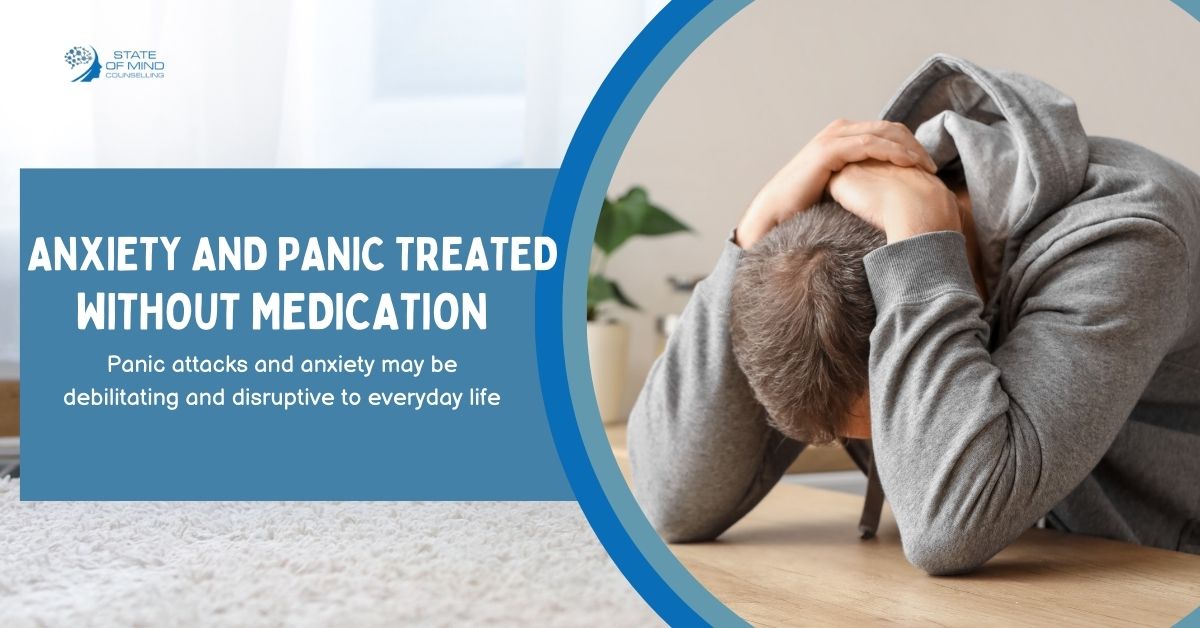Panic attacks and anxiety may be debilitating and disruptive to everyday life. Although many patients take great solace from medications, others would much rather regulate their symptoms with non-pharmacological methods. Fortunately, some evidence-based techniques exist free from dependency on medication that may help lower the frequency and severity of panic and anxiety episodes.
1. Healing Effects
Sometimes referred to as talk therapy, psychotherapy is fairly helpful for panic attacks and anxiety. Cognitive behavioral therapy (CBT) is among the most often utilized methods among them. The emphasis of this therapy is on spotting and modifying anxious negative thinking patterns. Guided sessions enable you to spot and challenge unjustified worries.
- Identify and question illogical anxieties.
- Change unfavorable mindset.
- Create strategies to manage panic attacks.
- Approach circumstances you might be avoiding gradually.
Often using exposure therapy where a therapist helps you face panic-inducing events in a controlled environment CBT lets your mind gradually become desensitized to these triggers.
2. Attention and Relaxation Strategies
Using relaxation strategies and mindfulness can greatly lower stress and anxiety. These approaches comprise:
- Meditating with an eye toward the present moment free from judgment can help with emotional control and lessen panic attacks.
- Under times of anxiety, controlled breathing slows down your heart rate and relaxes your neurological system.
- Tensing and relaxing several muscle groups can help to release physical tension and encourage rest.
- Including these techniques into your regular life can enable you to grow more in control over nervous emotions.
3. Modifications in lifestyle
Anxiety treatment and avoiding panic attacks mostly depends on developing good lifestyle choices. Think about doing the following:
- Frequent physical activity generates endorphins that boost mood and lower anxiety by means of aerobic workouts such as walking, running, or cycling.
- A nutrient-dense diet can assist to normalize blood sugar levels and boost general mental health.
- Enough Sleep: Give quality sleep first priority since sleep deprivation aggravates anxiety symptoms and helps neither body nor mind heal.
- Control stimulants: Steer clear of alcohol, nicotine, and caffeine since these drugs aggravate anxiety and frequency of panic attacks.
4. Methodologies of Stress Management
Reducing anxiety and panic attacks depends on well controlling stress. Among the few good stress-reducing strategies are:
- Time Management: Plan your day such that you never feel overburdened or anxious.
- Writing about your ideas and feelings could help you to find clarity and ease mental tension.
- Pursue your interests to help you relax and enhance emotional wellness by means of engaging activities.
5. Supporting Mechanisms
Speaking with people who know your experiences might help you emotionally and lessen loneliness. Examine the following support choices:
- Support Groups: Attaching a support group for anxiety or panic disorder lets you share your experiences and grow personally among others.
- Openly interact with loved ones who can provide solace and comfort amid trying circumstances.
6. Various Therapies
Complementary therapies help some people, however before usage these techniques should be addressed with a medical practitioner. Popular choices include:
- Acupuncture could assist control nervous system reactions and ease anxiety.
- Herbal Notes: Supplements Though further study is needed, some herbs such as lavender and valerian root may have soothing properties.
- Lavender or chamomile essential oils used in aromatherapy might help to relax and reduce anxiety.
When Should One Consult Professionals?
Although these strategies might help, you should see a professional if your panic or anxiety episodes are interfering with your daily activities. Mental health experts may create customized treatment plans to meet your particular requirements and track your progress.We at State of Mind Counseling are well aware of the challenges that have the potential to be brought about by panic and anxiety attacks. You may be able to get control of your anxiety and improve the quality of your life with the assistance of our compassionate team, as well as therapies that are both evidence-based and individualized psychotherapy.

